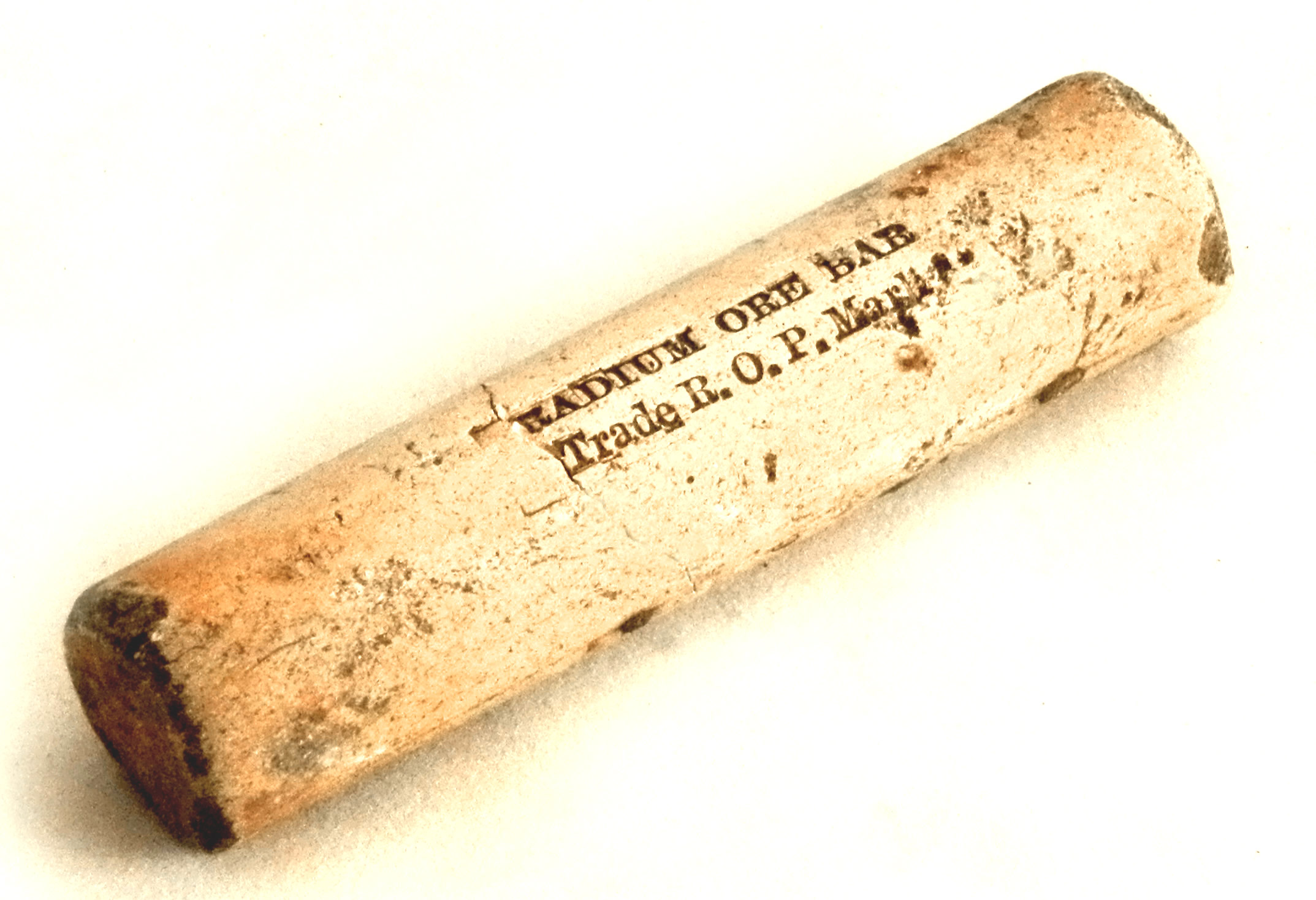Radium Ore Bar (ca. 1927-1934)

This device, manufactured by Radium Ore Products, was found near an early twentieth century landfill near Haileyville, Oklahoma.
It was intended to be used as follows "Put the bar in a quart milk bottle, fill with ordinary water and drink the water. Fill the bottle as you use the water." "Lasts a lifetime... A health spring with you when travelling, at your office, at your home, at your work... Not a cure-all, but has been used successfully in treatment of the ailments listed below." While that list of ailments is too long to present here, we can say this: if you have a medical problem, the bar would cure it.
"Men and women are making big money selling the Radium Ore Bar... Ask us about it when you send in your order."
Material: Clay
Size: 4.25" long, 1" diameter
Price: “Agents, Distributors and Mail Dealers, $1.” The retail price ranged from $2 to $3.50.
Radium Ore Products
Radium Ore Products, the manufacturer of the Radium Ore bar, was located in Anderson, California. Other than that, the only thing I know is that the company operated from 1927 or so until the early 1930s. I haven’t even a street address, let alone the names of individuals involved with it.
This is a guess, but I suspect that the original name for the company was the "Radium Treatment Company" and that their original address was 5910 College Street, Humboldt, CA. The towns Anderson and Humboldt are fairly close to each other and located in what might be considered a remote part of northern California. This guess is based on the following classified ad from the May 11, 1925 issue of the Berkeley Daily Gazette:
RADIUM TREATMENT CO.
The world's greatest health drink. Radioactive water is now available in your own home by means of radium ore. Also external appliances by means of belts, pads and saive. 5910 College. Humboldt 2634."
Marketing the Radium Ore Bar
The company’s marketing plan was to line up distributors to handle the retail sales. This strategy is evident from the text of a classified ad that appeared in the February 26, 1928 issue of the Anniston Star.
“WANTED—Agents and state distributors for the Radium Ore Bar. From 100 per cent to 200 percent profit. Every family needs and can afford one or more bars. Many testimonials from those who have been relieved of their ailments without taking medicine. For full particulars write, Radium Ore Products, Anderson, California.”
Radium Ore Products was a multi-level marketing operation where distributors were encouraged to establish their own network.
“Your name on the circular makes it a wonderful agency and mail order proposition, as you may appoint agents anywhere.”
And that is what their distributors tried to do. Quoting a classified ad of the Louisiana Radium Water Company (Indiana Weekly Messenger. Aug. 1, 1929):
“WYNNE RADIUM ORE BAR; lasts indefinitely. Nature’s way to health, regardless of your ailment . . . Agents wanted everywhere”
Distributors could have their names embossed on the bars (e.g., Wynne Radium Ore Bar, Hammer Radium Ore Bar). Personalized product literature was also available.
Partial list of distributors:
Corum Chemical Company
1130 7th Avenue
Laurel, MississippiE.M. Grund
3407-A Cherokee St.
St. Louis, MOHammer Laboratories, Inc, (sold Hammer Radium Ore Bar)
(Aka Hammer Radium Co.)
Denver, ColoradoHarry Harrison
716 1-2(?) Jackson Street
Chillicothe, MissouriLouisiana Radium Water Company (sold Wynne Radium Ore Bar)
PO Box 817
Shreveport, LouisianaRadium Ore Bar Distributors
O.R.C. Building
Cedar Rapids, Iowa
Trouble with the Federal Trade Commission
By conducting business through a series of distributors, Radium Ore Products managed to avoid scrutiny by the Federal Trade Commission (FTC). The distributors weren’t so lucky.
In a 1931 ruling (Docket 850), the FTC ordered an unnamed “individual, engaged in the sale and distribution of an article or product designated radium ore bar” to cease and desist their false and misleading advertising. In theory, the device could still be sold if nothing was said to imply that it would make water radioactive or that any medical benefits could result from its use.
An FTC complaint was filed against Hammer Laboratories, Inc. of Denver (Docket 2041) in May of 1932 for false and misleading statements regarding a variety of radioactive products. In addition to the Radium Ore Bar, these products included Hammer Standard Radium Pads, Radium Water Activator, Radiumar Cosmetics, Hammer Antiseptic Radium Suppositories, etc. The complaint was dismissed in February of 1934 because “the respondent corporation has been dissolved.” That explanation is a little strange because the company continued to operate for another two decades. Nevertheless, Hammer Laboratories might have decided at that point to limit their product line to educational materials of the type described in their 1939 catalog, e.g., uranium sources, radium sources, electroscopes, spinthariscopes, fluorescent chemicals.
Donated by the State of Oklahoma courtesy of Kevin Sampson.
Reference
Product Brochure. The Radium Ore Bar. Stamped APR 15, 1932.
